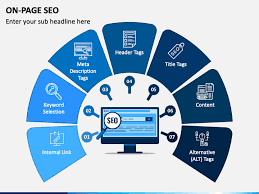The Ultimate Guide to On-Page SEO
Search Engine Optimization (SEO) is a crucial aspect of digital marketing, and on-page SEO plays a significant role in improving your website’s visibility and ranking on search engine results pages. In this guide, we’ll delve into the world of on-page SEO and explore the key strategies you need to implement for optimal results.
What is On-Page SEO?
On-page SEO refers to the practice of optimizing individual web pages to rank higher and earn more relevant traffic in search engines. This involves optimizing both the content and HTML source code of a page to make it more search engine-friendly.
Key Elements of On-Page SEO
Title Tags: The title tag is one of the most critical elements for on-page SEO. It should be concise, descriptive, and contain relevant keywords.
Meta Descriptions: Meta descriptions provide a brief summary of the content on a webpage. They should be compelling, informative, and include relevant keywords.
Headings: Proper use of headings (H1, H2, H3, etc.) helps search engines understand the structure and hierarchy of your content.
URL Structure: Use clean, descriptive URLs that include relevant keywords to improve user experience and search engine visibility.
Keyword Optimization: Incorporate relevant keywords naturally throughout your content while avoiding keyword stuffing.
Quality Content: Create high-quality, engaging content that provides value to your audience and encourages user engagement.
Tips for Effective On-Page SEO
– Conduct keyword research to identify relevant keywords for each page.
– Optimise images with descriptive alt text.
– Improve page loading speed for better user experience.
– Use internal linking to connect related pages on your website.
– Monitor and analyse your on-page performance using tools like Google Analytics.
In Conclusion
Incorporating effective on-page SEO techniques is essential for boosting your website’s visibility and driving organic traffic. By focusing on key elements such as title tags, meta descriptions, headings, URL structure, keyword optimization, and quality content, you can enhance your website’s ranking in search engine results pages and attract more visitors to your site.
Eight Essential On-Page SEO Tips for Enhancing Your Website’s Visibility in the UK
- 1. Conduct keyword research to identify relevant keywords for your content.
- 2. Optimise your page titles with primary keywords towards the beginning.
- 3. Write unique and compelling meta descriptions to improve click-through rates.
- 4. Use heading tags (H1, H2, etc.) to structure your content logically and include keywords.
- 5. Ensure your website loads quickly by optimising images and minimising code.
- 6. Create high-quality, valuable content that is engaging for users and includes relevant keywords naturally.
- 7. Include internal links to other pages on your website to improve navigation and spread link equity.
- 8. Regularly monitor and analyse your on-page SEO performance using tools like Google Analytics.
1. Conduct keyword research to identify relevant keywords for your content.
Conducting thorough keyword research is a fundamental step in effective on-page SEO. By identifying relevant keywords for your content, you can better understand what your target audience is searching for and tailor your content to meet their needs. Choosing the right keywords can significantly impact your website’s visibility and ranking on search engine results pages, ultimately driving more organic traffic to your site.
2. Optimise your page titles with primary keywords towards the beginning.
Optimising your page titles with primary keywords placed towards the beginning is a crucial strategy in on-page SEO. By strategically incorporating relevant keywords at the start of your title tags, you signal to search engines the main focus of your content, increasing the likelihood of ranking higher in search results for those specific terms. This practice not only improves search engine visibility but also enhances user experience by providing clear and concise information about the content of the page.
3. Write unique and compelling meta descriptions to improve click-through rates.
Crafting unique and compelling meta descriptions is a crucial aspect of on-page SEO. By creating concise summaries that accurately reflect the content of your web pages and incorporating relevant keywords, you can significantly improve click-through rates from search engine results pages. A well-crafted meta description not only entices users to click on your link but also enhances the overall user experience by providing valuable information upfront. This simple yet effective strategy can make a substantial difference in driving organic traffic to your website and boosting your online visibility.
4. Use heading tags (H1, H2, etc.) to structure your content logically and include keywords.
Utilising heading tags such as H1, H2, etc., is a fundamental aspect of on-page SEO that can significantly impact the visibility and ranking of your website. By structuring your content logically with relevant heading tags and incorporating targeted keywords within them, you not only make it easier for search engines to understand and index your content but also improve the overall user experience. This practice helps both search engines and users navigate your page efficiently, enhancing its relevance and authority in search results.
5. Ensure your website loads quickly by optimising images and minimising code.
Ensuring that your website loads quickly is a crucial aspect of on-page SEO. By optimising images and minimising unnecessary code, you can improve the overall performance and user experience of your site. Large image files and bloated code can slow down loading times, leading to higher bounce rates and lower search engine rankings. By implementing these optimisation techniques, you not only enhance your website’s SEO but also provide visitors with a seamless browsing experience that keeps them engaged and coming back for more.
6. Create high-quality, valuable content that is engaging for users and includes relevant keywords naturally.
Creating high-quality, valuable content that is engaging for users and incorporates relevant keywords naturally is a cornerstone of effective on-page SEO. By offering informative and compelling content that resonates with your target audience, you not only enhance user experience but also improve your website’s visibility in search engine results. Striking the right balance between valuable information and strategic keyword placement can significantly boost your organic search rankings and drive more traffic to your site.
7. Include internal links to other pages on your website to improve navigation and spread link equity.
Including internal links to other pages on your website is a crucial on-page SEO strategy that not only enhances navigation for users but also helps spread link equity throughout your site. By strategically linking related content within your website, you can guide visitors to relevant information, improve their overall browsing experience, and signal to search engines the importance and interconnectedness of your web pages. This practice not only boosts user engagement but also strengthens the overall authority and visibility of your website in search engine results.
8. Regularly monitor and analyse your on-page SEO performance using tools like Google Analytics.
Regularly monitoring and analysing your on-page SEO performance using tools such as Google Analytics is crucial for maintaining and improving your website’s visibility and ranking in search engine results. By tracking key metrics like organic traffic, bounce rate, and conversion rates, you can gain valuable insights into the effectiveness of your SEO strategies. This data allows you to identify areas for improvement, make informed decisions, and ultimately enhance the overall performance of your website in the competitive online landscape.




